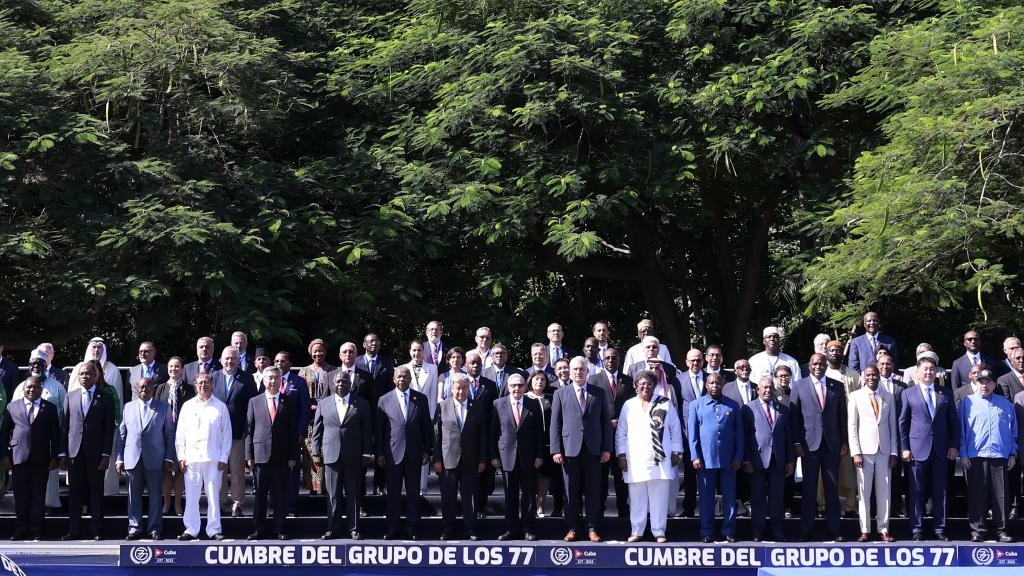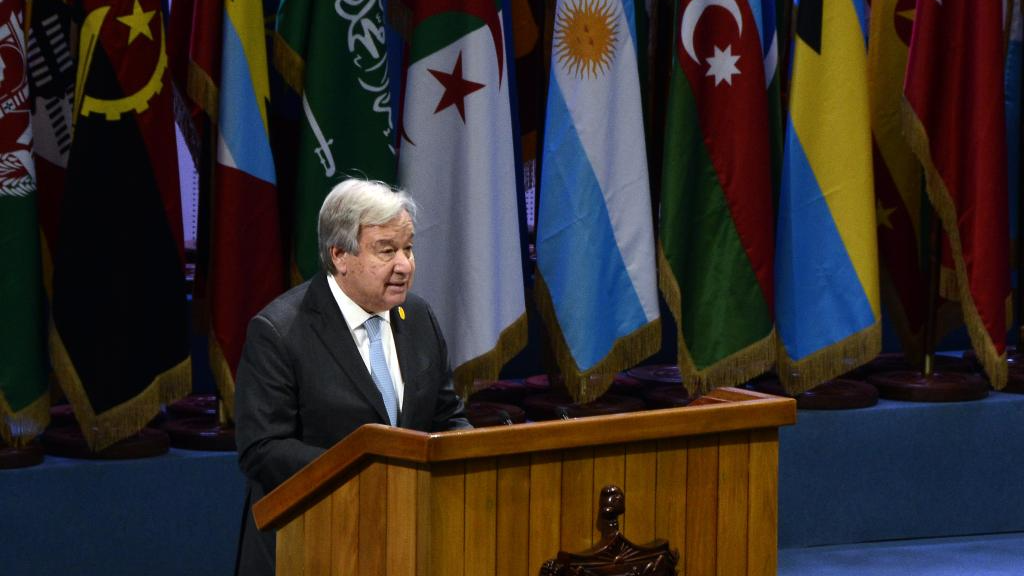
Delegates attending the Summit of the Group of 77 (G77) and China pose for a group photo in Havana, Cuba, September 15, 2023. /Xinhua
Delegates attending the Summit of the Group of 77 (G77) and China pose for a group photo in Havana, Cuba, September 15, 2023. /Xinhua
Editor's note: Bobby Naderi, a special commentator on current affairs for CGTN, is a London-based journalist, guest contributor in print, radio and television, and documentary filmmaker. The article reflects the author's opinions, and not necessarily the views of CGTN.
The Group of 77 plus China (G77+China) Summit, held in Havana, Cuba, on September 15 to 16, was a remarkable convergence of leaders from emerging economies. Representing an astounding 80 percent of the world's population, this significant gathering served as a pivotal moment in the ongoing struggle for global economic justice and inclusivity.
In his speech to the summit, UN Secretary-General António Guterres said the world is failing developing countries and that these countries are "trapped in a tangle of global crises," pointing to climate change and foreign debt. He urged China and the Group of 77 nations to work together to create a more just world.
In effect, Guterres recognizes that the G77+China Group has emerged as a ray of light for the Global South in a time when opposition to multilateralism, international cooperation, and the ideals of equitable development is on the rise.
Opportunities and threats
In today's complicated global environment, developing nations face a variety of difficulties. These issues include sluggish economic expansion, mounting debt, geopolitical unrest, environmental degradation, populist and unilateralism attacks, and geopolitical tensions. China and developing nations have collaborated to protect their legitimate interests and advance sustainable development in the face of these formidable obstacles.
Li Xi, a member of the Standing Committee of the Political Bureau of the Communist Party of China Central Committee, said during the summit that Beijing is ready to work with G77 members to deepen the South-South and Belt and Road Initiative (BRI) cooperation, and to support the Global Development Initiative for the goal of greater development and stronger solidarity.
There's nothing new about most of this. In line with the UN's 2030 Agenda for Sustainable Development, the open and inclusive BRI places great emphasis on public health, environmental sustainability, and economic growth. Consequently, collaboration among the participating countries has boosted infrastructure in partner countries, opening up commercial opportunities and unlocking development potential.

UN Secretary-General Antonio Guterres addresses the Summit of the Group of 77 (G77) and China in Havana, Cuba, September 15, 2023. /Xinhua
UN Secretary-General Antonio Guterres addresses the Summit of the Group of 77 (G77) and China in Havana, Cuba, September 15, 2023. /Xinhua
The G77+China Group's top objectives and accomplishments include:
Supporting multilateralism: The group agrees that cooperation between nations is necessary for solving global problems. It has worked to uphold international law, protect the global consensus, and promote international collaboration. The organization is dedicated to defending the global order founded on respect for national sovereignty, encouragement of the development agenda, and defense of the interests of the Global South.
South-South cooperation: By putting the 2030 Agenda for Sustainable Development into action, the organization has solidified South-South cooperation. It has enhanced North-South and triangular cooperation rather than replacing it.
Right to sustainable development: The organization is committed to defending the human right to development as well as all other rights guaranteed by international law and the UN Charter. The group has already made substantial progress in eradicating underdevelopment in participating countries by addressing policy coordination, infrastructural connection, trade facilitation, financial integration, and people-to-people connectivity. According to the group, investing in sustainable development will help the world become more resilient to crises, conflicts, and natural catastrophes over the long run.
Poverty eradication: In accordance with the idea of shared but distinct duties, the organization places a high focus on ending poverty in all of its manifestations. Millions of people have benefited directly from the group's comprehensive approach to development, which has opened up opportunities, lowered trade obstacles, and sparked economic growth. The good news is that the summit promised to raise even more people and communities out of poverty as it develops and grows, furthering the common vision of a more affluent and equitable world.
Climate change: The group is dedicated to acting quickly to address this global issue, acknowledging the disproportionate impact that climate change has on developing nations. It also demonstrated resilience in the face of unforeseen difficulties like the COVID-19 outbreak. China and its partners worked together to combat the virus by exchanging knowledge, supplying medical supplies, and assisting with the delivery of vaccines. This collaboration conveys the group's dedication to promoting world health.
Protection of inalienable rights: The group has taken the lead in safeguarding the inalienable rights of people, such as the right to self-determination and freedom from foreign rule. In addition to Africa, the least developed countries, small developing island states, middle-income countries, and those under colonial and foreign control, the G77+China Group seeks to safeguard the interests of all of its geographical constituents.
Revitalizing Global System of Trade Preferences (GSTP): Reviving the GSTP among developing countries is one of the group's major accomplishments. Especially in times of friction between multilateral trading agreements, this interregional trading pact has been able to improve trade flows and relations among its Global South partners.
Communications and outreach: Effective outreach and communication are essential in the internet era for garnering support and spreading awareness of the needs and issues facing developing countries. The group understands how critical it is to boost outreach and communication activities. For instance, in order to reach a wider audience, including officials, students, lawmakers, members of civil society, and development specialists, many member states have updated chapter websites.
As highlighted by the speakers of the summit in Havana, the G77+China Group is still a powerful force in world diplomacy, defending the rights of developing countries and fostering international collaboration. The participants agreed to remain dedicated to the group's values and goals in the face of difficulties, such as attacks on multilateralism and the growing threat of unilateralism and protectionism.
(If you want to contribute and have specific expertise, please contact us at opinions@cgtn.com. Follow @thouse_opinions on Twitter to discover the latest commentaries in the CGTN Opinion Section.)